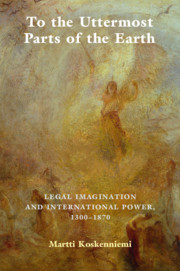Book contents
- To the Uttermost Parts of the Earth
- To the Uttermost Parts of the Earth
- Copyright page
- Dedication
- Contents
- Acknowledgements
- Introduction
- Part I Towards the Rule of Law
- Part II France: Law, Sovereignty and Revolution
- 5 Governing Sovereignty
- 6 Reason, Revolution, Restoration
- 7 Colonies, Companies, Slaves
- Part III Britain: Laws and Markets
- Part IV Germany: Law, Government, Freedom
- Bibliography
- Index
6 - Reason, Revolution, Restoration
European Public Law 1715–1804
from Part II - France: Law, Sovereignty and Revolution
Published online by Cambridge University Press: 05 August 2021
- To the Uttermost Parts of the Earth
- To the Uttermost Parts of the Earth
- Copyright page
- Dedication
- Contents
- Acknowledgements
- Introduction
- Part I Towards the Rule of Law
- Part II France: Law, Sovereignty and Revolution
- 5 Governing Sovereignty
- 6 Reason, Revolution, Restoration
- 7 Colonies, Companies, Slaves
- Part III Britain: Laws and Markets
- Part IV Germany: Law, Government, Freedom
- Bibliography
- Index
Summary
Eighteenth-century political writers in France such as Abbé de Saint-Pierre or Abbé de Mably developed schemes for perpetual peace and used the idiom of Droit public de l’Europe (European public law) to found the administration of foreign affairs on a scientific analyses of the real, instead of imagined, interests of the state. But once the calculative orientation was pushed far enough, it turned into a speculation that received its most advanced articulation in the physiocratic theory about optimal relations between economic actors. The state works best, they argued, once both the sovereignty of the ruler and property rights are both conceived as absolutes. Many revolutionaries shared these views and aimed to realise them by abolishing noble privileges and declaring all French white males free and equal. At one stage, the revolutionaries even tried to write these principles into the foundation of a new law of nations. Nothing became of this, however, and while restoration elites briefly flirted with applying the scientific pretensions of the enlightenment to the business of government, the post-Napoleonic moment returned to the forms of old-regime diplomacy.
- Type
- Chapter
- Information
- To the Uttermost Parts of the EarthLegal Imagination and International Power 1300–1870, pp. 417 - 487Publisher: Cambridge University PressPrint publication year: 2021

